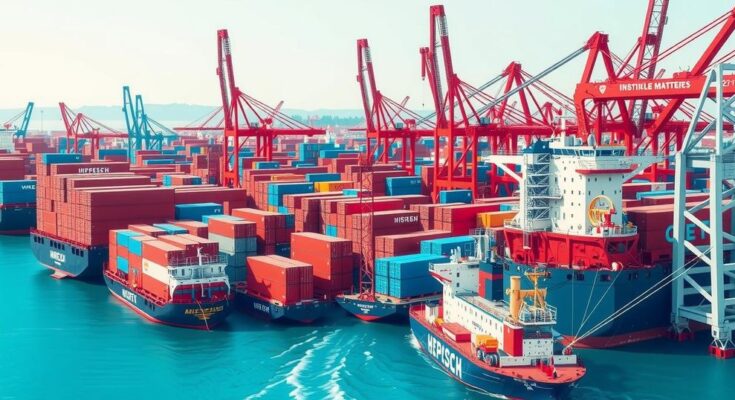CK Hutchison has sold its stakes in Panama Canal ports to BlackRock for $23 billion, triggering criticism from Beijing for prioritizing profit over national interests. As the U.S. increases pressure to diminish Chinese influence in Latin America, Hutchison finds itself navigating a precarious situation, caught between conflicting demands from the U.S. and China.
CK Hutchison Holdings, based in Hong Kong, has faced significant backlash from Beijing following its recent sale of stakes in the Panama Canal ports to American investment firm BlackRock. Valued at $23 billion, the deal includes 43 container ports across 23 countries, particularly strategic locations such as the Balboa and Cristobal docks. Hutchison’s decision is a dramatic shift as it withdraws from nearly all global port holdings, retaining only those within China, and will net the company $19 billion in cash.
This sale occurs amidst increasing pressure from the U.S., with former President Donald Trump advocating for the end of China’s dominance over the Panama Canal following his re-election. Analysts suggest that rising U.S. efforts to diminish Chinese influence in Latin America may have influenced Hutchison’s controversial divestiture, igniting concerns about foreign diplomatic pressures.
Beijing has responded vigorously, criticizing Hutchison for prioritizing profit over national security. A commentary in the pro-Beijing publication Ta Kung Pao labeled Hutchison’s decision as detrimental to China and warned businessmen against aligning with U.S. interests, which could tarnish their reputations in the Chinese market. The article emphasized concerns about the implications of handing over vital infrastructure to what it called an “ill-intentioned U.S. entity.” Beijing-affiliated media has reiterated this criticism, further pressuring Hutchison to reconsider its decision.
Hutchison now finds itself in a precarious position as it navigates pressures from both the U.S. and China. Should it decide to withdraw from the sale, it may be perceived as conceding to Beijing, risking U.S. displeasure. Conversely, advancing the sale could trigger regulatory repercussions in China, jeopardizing its other business interests. Historically, Chinese officials have favored companies that prioritize national interests, illustrating the delicate balance Hutchison must maintain between the demands of the two superpowers.
BlackRock, while a major global investment firm managing assets worth $11.5 trillion, has adopted a discreet approach regarding this transaction. However, its extensive business engagements in China and connections with Trump raise additional geopolitical concerns. Analysts see this agreement as potentially indicative of a broader U.S. strategy aimed at undermining China’s control over global trade networks.
As opposition from Beijing intensifies, the deal may face significant regulatory or diplomatic challenges. If completed, it would solidify U.S. strategic interests in the Panama Canal; conversely, if China’s pressure results in Hutchison retracting its decision, it could symbolize Beijing’s enduring control over critical infrastructure negotiations worldwide. Currently, CK Hutchison remains embroiled in a fraught power struggle, balancing the competing influences of both nations.
The sale of Hutchison’s Panama Canal ports to BlackRock has intensified geopolitical tensions between the U.S. and China. As Hutchison grapples with potential repercussions from both sides, its decision underscores the complexities of international business in a politically charged environment. Observers will be closely monitoring developments, particularly regarding Beijing’s influence and potential regulatory actions that may arise.
Original Source: www.business-standard.com




